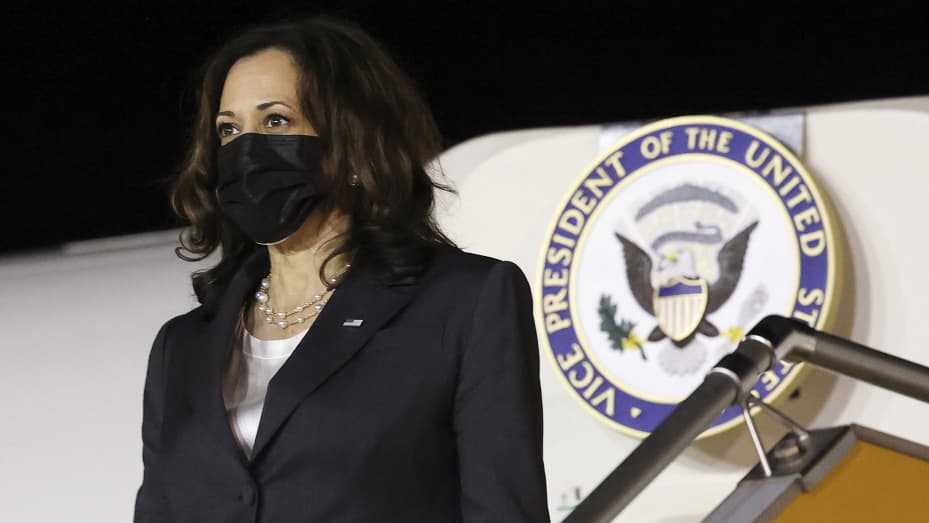Kamala Harris kicks off Vietnam visit by calling out China’s ‘bullying’ tactics
- The strategic competition between the U.S. and China came to forefront as Vice President Kamala Harris kicked off the second leg of her official visit to Southeast Asia in Vietnam.
- Harris told Vietnamese officials in capital city of Hanoi on Wednesday that there was a need to pressure Beijing on its actions in the South China Sea.
- The vice president is scheduled to conclude her Southeast Asia trip on Thursday.

The strategic competition between the U.S. and China came to forefront as Vice President Kamala Harris kicked off the second leg of her official visit to Southeast Asia in Vietnam.
Harris told Vietnamese officials in the capital city of Hanoi on Wednesday there was a need to put pressure Beijing on its actions in the South China Sea. Vietnam is a vocal opponent of China’s vast territorial claims in the strategic waterway.
“We need to find ways to pressure and raise the pressure, frankly, on Beijing to abide by the United Nations Convention on the Law of the Sea, and to challenge its bullying and excessive maritime claims,” said Harris.
The United Nations Convention on the Law of the Sea or UNCLOS is an international treaty that outlines nations’ rights and responsibilities in the world’s ocean space. It forms the basis for how international courts, such as the International Tribunal for the Law of the Sea, settle maritime disputes.

Harris’ comment followed her speech in Singapore on Tuesday, when she said Beijing had continued “to coerce, to intimidate and to make claims to the vast majority of South China Sea.”
The South China Sea is resource-rich waterway that’s a vital commercial shipping route where trillions of dollars of world trade pass through each year. China claims nearly the entire sea — parts of which have also been claimed by some Southeast Asian countries including Vietnam, Malaysia and the Philippines.
In 2016, a tribunal at the Permanent Court of Arbitration dismissed China’s claim as legally baseless — a ruling Beijing ignored.
In response to Harris’ Singapore speech, Chinese state media accused the American vice president of seeking to “drive a wedge” between China and its Southeast Asian neighbors.
Ahead of her arrival in Vietnam on Tuesday evening, Vietnamese Prime Minister Pham Minh Chinh and China’s ambassador to Vietnam held a previously unannounced meeting, reported Reuters. During the meeting, the Chinese ambassador pledged a donation of two million Covid-19 vaccine doses to Vietnam, according to the report.
‘Biggest’ geopolitical contest
While Harris has been cautious about hitting out at Beijing, political analysts and former diplomats said there is little doubt that her trip is part of the U.S.′ strategy in competing with China.
The rivalry between the U.S. and China is the “biggest” geopolitical issue currently, said Kishore Mahbubani, a prominent former Singapore diplomat.
“So clearly the visit of Vice President Kamala Harris is part of the contest between United States and China,” Mahbubani, now a distinguished fellow at the National University of Singapore’s Asia Research Institute, told CNBC’s “Street Signs Asia” on Wednesday.
“Southeast Asia is going to be a very, very critical arena of that competition,” he said.
His sentiment is shared by Curtis Chin, a former U.S. ambassador to the Asian Development Bank. Chin said the rise of China is “a big foreign policy challenge” for the U.S. and much of the world, even as the fallout in Afghanistan continues.
United States needs to go all in in its attention to Southeast Asia and really much of Asia, not just the countries that we have formal alliances with.Curtis ChinSENIOR FELLOW, MILKEN INSTITUTE
President Joe Biden has faced criticism over how he handled the withdrawal of American forces from Afghanistan. The issue has overshadowed Harris’ trip to Southeast Asia, with reporters focusing their questions on Afghanistan at the vice president’s joint press conference with Singapore Prime Minister Lee Hsien Loong on Monday.
“United States needs to go all in in its attention to Southeast Asia and really much of Asia, not just the countries that we have formal alliances with,” Chin, senior fellow at the Milken Institute, told CNBC’s “Squawk Box Asia” on Wednesday.
“And when I say all in, that isn’t just diplomatic and military engagements, it means real business engagement — that’s what the United States also needs to focus on,” he added.
In her talks with Singapore’s prime minister, Harris discussed issues ranging from supply chains to climate change and the pandemic.
She announced in Vietnam that the U.S. will donate an additional one million doses of Pfizer’s Covid vaccine — taking the total U.S. donation to the Southeast Asian country to six million doses. Harris also launched the U.S. Centers for Disease Control and Prevention’s new Southeast Asia regional office in Hanoi.
The vice president is scheduled to conclude her Southeast Asia trip on Thursday.
No comments:
Post a Comment
Comments always welcome!